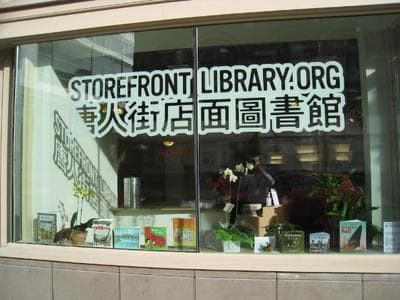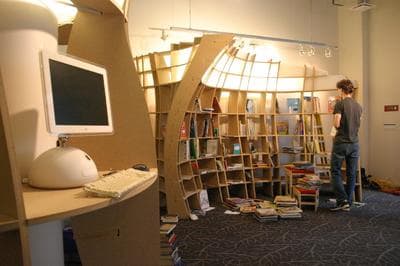Advertisement
In Chinatown, Borrowed Books On Borrowed Time

When you walk down a city street, past dark, vacant storefronts, do you see blight — or possibility?
Well, about nine months ago some artists took the idea of empty real estate, mashed it up with a need, and created a challenge.
"I like to have these kinds of things happen in my neighborhood," said Leslie Davol, "where there's temporary things that come and go, and there's creative use of space."
Davol moved to Boston's Chinatown four years ago with her two children and husband Sam, who is also an artist and musician. As residents here they noticed something was missing: a library. In record time they pulled together a daring, community-driven project called the Chinatown Storefront Library.
"We're playing a little game here of mimicking what libraries do," Davol admitted. "We're going to have policies about computer use, we will have some rules."
Keeping your voice down, for instance. But while the Storefront Library is stocked with donated books — in English and Chinese — and is fully functional, there's a catch.
"We don't have a permanent space, and we don't have a permanent staff," Davol said, "so it's ephemeral."
And that's the point, according to Davol, who also started an organization called Boston Street Labs.
The library will only be open for three months. Why? Because it's an experiment. And a demonstration project. It's meant to illustrate the political, civic and creative will it takes to make something like this happen in a city like Boston. It also shows how short-term solutions can be pulled off much more quickly than going through normal bureaucratic channels.
"You know it's political and it's thinking about all the different sides, and really trying to craft a project that works for everybody," Davol said.
"Everybody" includes collaborating designers and advocates from Chinatown, but also architects, the city of Boston, and the national real-estate developer that donated the vacant space for the three-month period.
Advertisement
People from the real Boston Public Library served as advisors for the Storefront in Chinatown. "I call it the guerilla library," said BPL President Amy Ryan, because the artists behind the temporary library were nimble. They operated "off-the-grid," broke the rules and bypassed the red tape that comes with building a real, permanent library.
"What they artfully did was create a facility to fill an intellectual need, or a cultural need," Ryan said, "and that's what's so exciting about the complex thinking of the group that they pulled together."

Ryan acknowledged that if the Chinatown Storefront Library wasn't temporary, it likely wouldn't be open at all. And while there's a ton of excitement around the fact that the library project got off the ground — and got off quickly — the fact is it's been a long time coming.
Two people in particular have dedicated themselves to this mission: Marika Trotter and Stephanie Fan.
"This is something I've wanted to see back in the community ever since the Chinatown Branch Library disappeared in the '50s," admitted Stephanie Fan, who grew up in Chinatown and remembers the old library well. Fan helped start an advocacy group called The Friends of the Chinatown Library, and said, with a laugh, that the traditional route for getting a library built in Boston has been frustrating.
"Of course it's been frustrating!" she said. "You know, 10 years is a long time to wait for a library and you know it looks like it's going to be at least 10 years."

Designer and architect Marika Trotter led a feasibility study that was commissioned by the city of Boston in 2007, which looked hard at what it would take to construct a permanent branch in Chinatown. Things were looking good, Trotter said, then the economy tanked. But her work didn’t go to waste.
"From a design point of view our goal was to create an exciting, fresh, speculative prototype of what a library in the 21st century might be like," she said.
And that's what the Chinatown Storefront Library is, Trotter said, even if it is temporary. Trotter and Fan will continue to advocate for a permanent library after the temporary one shuts its doors in three months.
But Leslie Davol and her husband have other plans. They said they want to step back from it, "and leave it as it is, a Storefront Library, and have it be this experimental thing that is temporary that sparks new ideas and also gives people a vision of the city and what it could be with a mix of uses."
And so Leslie and Sam Davol are on the look out — for buildings with holes in their leases, little slices of time, vacant real estate — so they can percolate their next experiment that will surely rely on borrowed spaces in Boston.
The Chinatown Storefront Library opens Oct. 15 at 640 Washington Street, between Essex and Beach Streets.
This program aired on October 15, 2009.

